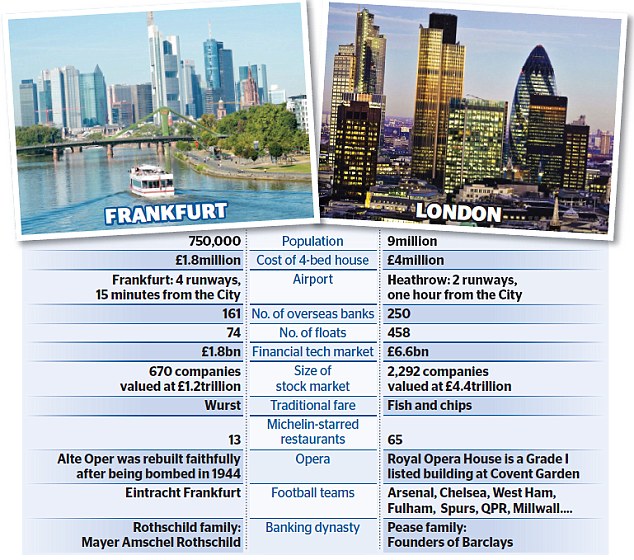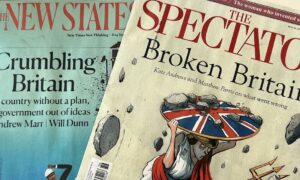If you believe “Brexit means Brexit,” the middle of October has been your worst few days since Prime Minister Theresa May and the Tories got blown out in the June elections.
 Increasingly, the Magic 8 Ball is showing “outlook not so good” as May & Co. have experienced a series of setbacks on the way to 30 March 2019.
Increasingly, the Magic 8 Ball is showing “outlook not so good” as May & Co. have experienced a series of setbacks on the way to 30 March 2019.
Let’s just go straight to the developments of the last few days:
• Goldman Sachs Chairman Lloyd Blankfein noted he’ll be spending “a lot more time in Frankfurt,” hinting top executives at the world’s largest investment bank will join other financial giants considering moving operations to Frankfurt from London post-Brexit.
• German media quoted leaked reports that May “begged” EU President Jean-Claude Juncker for help reaching a deal that would be satisfactory to the British public. Juncker has denied the reports.
• European Council President Donald Tusk suggested Monday that it’s “up to London” how Brexit ends, according to Sky News: “With a good deal, no deal or no Brexit.” He added that the 27 European Union members must remain united as the coming “stress test” of negotiations will test EU unity.
• Five of Britain’s most business associations wrote a letter to the May government urging a swift transition deal with the EU to avoid damaging the UK’s economy.
• Last weekend, Spanish Foreign Minister Alfonso Dastis assured the 310,000 British expats living in Spain they’ll be able to stay in the event of a no-deal Brexit, according to the Independent: “Over 17 million Brits come to Spain every year and many of them live here or retire here and we want to keep it that way as much as possible.”
However, it’s not clear Spain as an EU member has the legal right to unilaterally create a special citizenship class outside of the Schengen Agreement.
Expats as bargaining chips
As entertaining as the Brexit v. EU drama is, the final shape of agreements – or no agreement – ultimately has a huge impact on the fates of real people including the estimated 1 million British expats living in Spain, France, Portugal, and other EU countries.
Sue Wilson, chairwoman of expat rights group Bremain in Spain, says a no-deal Brexit is “looking more likely, but I still don’t think it’s inevitable.”
Are expats bargaining chips?
“Both EU negotiators and the May government have said, ‘We’re the No. 1 priority.’ ” But Wilson’s concern now is that negotiations will move on to trade and to other issues before there is complete agreement on citizens’ rights and freedom of movement.
“Our worry is discussions will move on to Phase II … trade and transition. With citizens’ rights and free movement getting pushed to the back of the queue, I’m worried they’ll move on and we’ll be background and disappear.”
Nothing is agreed till everything is agreed, she said.
A change in public opinion
Wilson does see some indication in the British press that people are starting to hedge with “if Brexit happens,” not “when Brexit happens.” As time passes, it’s more obvious the public is starting to see the negotiations going very badly and sentiment is changing. As public sentiment moves, more politicians are standing up, she said.
As public opinion, shifts, some MPs are starting to notice, especially in the House of Lords, but they’re not yet in a position to take a public stance, Wilson said.
“We just have to keep campaigning, and that’s what we’re doing.”
Even the rightwing, pro-Brexit Daily Express newspaper, owned by Eurosceptic billionaire Richard Desmond, has had posts questioning how Brexit negotiations are being conducted, she noted.
There are both positive developments and negative, Wilson said.
On the positive side, the political conversation has shifted from Brexit as a certainty to a possibility. There’s less backlash if people dare suggest a second referendum, with the botched negotiations making it more difficult for Brexiteers to fall back on “will of the people/democratic process” line.
Moreover, the business community has become increasingly vocal that a no-deal Brexit could wreck Britain’s economy.
“I find it puzzling the Tories claim to be the party of business, but are ignoring all the evidence and experts as companies begin to leave the UK,” Wilson said.
But a second referendum is also “a dangerous tool” to use, she added.
Just as with the original 2016 Brexit vote, the British public could be manipulated and misinformed, and a decision on a very complex deal may not be that easy to make, Wilson said.
If the referendum failed, that would end all chances of reversing Brexit.
If Brexit is indeed reversed and the UK returns to “normal,” Wilson said she hopes there will be more emphasis on the benefits of being in the EU:
“For the past 40 years, people have been told all the ills of society were because of the EU.”
Co-CEO of Dispatches Europe. A former military reporter, I'm a serial expat who has lived in France, Turkey, Germany and the Netherlands.















